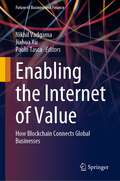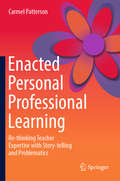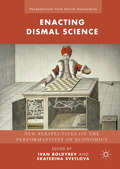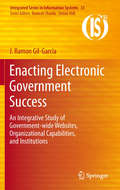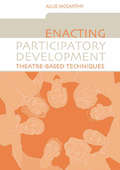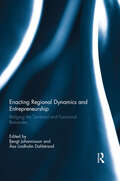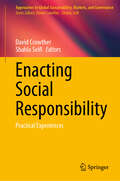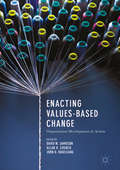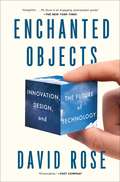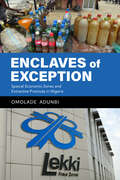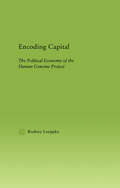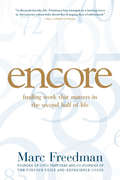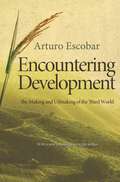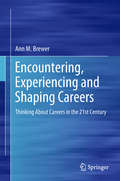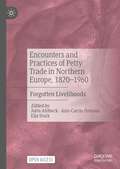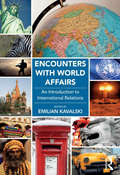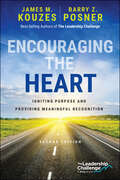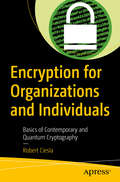- Table View
- List View
Enabling the Internet of Value: How Blockchain Connects Global Businesses (Future of Business and Finance)
by Paolo Tasca Jiahua Xu Nikhil VadgamaThis book shows how blockchain technology can transform the Internet, connecting global businesses in disruptive ways. It offers a comprehensive and multi-faceted examination of the potential of distributed ledger technology (DLT) from a new perspective: as an enabler of the Internet of Value (IoV). The authors discuss applications of blockchain technology to the financial services domain, e.g. in real estate, insurance and the emerging Decentralised Finance (DeFi) movement. They also cover applications to the media and e-commerce domains. DLT’s impacts on the circular economy, marketplace, Internet of Things (IoT) and oracle business models are also investigated. In closing, the book provides outlooks on the evolution of DLT, as well as the systemic governance and privacy risks of the IoV. The book is intended for a broad readership, including students, researchers and industry practitioners.
Enacted Personal Professional Learning: Re-thinking Teacher Expertise with Story-telling and Problematics
by Carmel PattersonThis book offers a vital new approach to teacher professional learning, drawing on teachers’ stories from the field. It investigates expert teachers’ professional learning and uses a narrative framework to analyse their meaning-making processes. The book focuses on how proficient teachers develop their expertise, emphasising that individual needs and the contextual nature of learning require a personally enacted approach. Further, it explores the stories of five secondary school teachers, nominated by their colleagues for their outstanding expertise, to present new insights into expert teachers’ views. Using a new evidence-based approach, Enacted Personal Professional Learning, it incorporates teachers’ unique perspectives, problems and thought processes in order to understand expert teachers’ learning, and offers essential principles for promoting storytelling to help teachers be or become empowered educators who can actively shape education communities for teacher professional learning.
Enacting Dismal Science
by Ivan Boldyrev Ekaterina SvetlovaIn this book, sociologists, philosophers, and economists investigate the conceptual issues around the performativity of economics over a variety of disciplinary contexts and provide new case studies illuminating this phenomenon. In featuring the latest contributions to the performativity debate the book revives discussion of the fundamental questions: What precise meaning can we attribute to the notion of performativity? What empirical evidence can help us recognize economics as performative? And what consequences does performativity have for contemporary societies? The contributions demonstrate how performativity can serve as a powerful conceptual resource in dealing with economic knowledge, as an inspiring framework for investigating performative practices, and as an engine of discovery for thinking of the economic proper.
Enacting Electronic Government Success
by J. Ramon Gil-GarciaMany countries around the world are investing a great amount of resources in government IT initiatives. However, few of these projects achieve their stated goals and some of them are complete failures. Therefore, understanding e-government success has become very important and urgent in recent years. In order to develop relevant knowledge about this complex phenomenon, researchers and practitioners need to identify and assess what are the main conditions, variables, or factors that have an impact on e-government success. However, before being able to evaluate these impacts, it is necessary to define what e-government success is and what some e-government success measures are. This book presents a review of both e-government success measures and e-government success factors. It also provides empirical evidence from quantitative analysis and two in-depth case studies. Although based on sound theory and rigorous empirical analysis, the book not only significantly contributes to academic knowledge, but also includes some practical recommendations for government officials and public managers. Theoretically, the book proposes a way to quantitatively operationalize Fountain's enactment framework. Based on the institutional tradition, the technology enactment framework attempts to explain the effects of organizational forms and institutional arrangements on the information technology used by government agencies. According to Fountain (1995; 2001) the technology enactment framework pays attention to the relationships among information technology, organizations, embeddedness, and institutions. This framework is very well known in the e-government field, but is normally used for qualitative analysis and there is no previous proposal of how to use it with quantitative data. The book proposes variables to measure each of the different constructs in this framework and also tests the relationships hypothesized by Fountain's theory. Finally, using the advantages of the selected quantitative analysis technique (Partial Least Squares), the study also proposes some adjustments and extensions to the original framework in a theory building effort. Methodologically, the book reports on one of the first multi-method studies in the field of e-government in general and e-government success in particular. This study uses a nested research design, which combines statistical analysis with two in depth case studies. The study begins with a statistical analysis using organizational, institutional, and contextual factors as the independent variables. An overall score representing e-government success in terms of the functionality of state websites is the dependent variable. Second, based on the statistical results two cases are selected based on their relative fitness to the model (residuals) and their position in the general ranking of website functionality (which includes four different measures). In order to complement the results of the statistical analysis, case studies were developed for the two selected states (New York and Indiana), using semi-structured interviews and document analysis. In terms of the statistical analysis, the book constitutes one of the first applications of Partial Least Squares (PLS) to an e-government success study. PLS is a structural equations modeling (SEM) technique and, therefore, allows estimating the measurement model and the structural model simultaneously. The use of this sophisticated statistical strategy helped to test the relationships between e-government success and different factors influencing it, as well as some of the relationships between several of the factors, thus allowing exploring some indirect effects too.
Enacting Participatory Development: Theatre-based Techniques
by Julie MccarthyTheatre can play an essential role in addressing issues of power in social, political and cultural relationships, and acting as a catalyst for personal and societal change. This comprehensive and lively sourcebook advocates the use of theatre in participatory development as a way for groups to discover their own goals and aspirations, and to develop strategies for improving their lives based on need and experience. The first part presents 140 exercises designed to be used at all stages of participatory workshops ranging from initial ice-breakers and warm ups to exercises dealing with conflict resolution, power relations, issue-based work and project evaluation. Each exercise is explained in an easy-to-follow format and is followed by commentaries from experienced field practitioners. The second part contextualises theatre for development practice within current debates on empowerment and participation, and presents case studies illustrating the diverse contexts in which theatre for development can be used.
Enacting Regional Dynamics and Entrepreneurship: Bridging The Territorial And Functional Rationales
by Bengt Johannisson Åsa Lindholm DahlstrandIn present digital times the focus is on globalization and the dynamics and complexities that it creates. However, in spite of being dominated by technology the world remains populated by human beings practising a localized everyday life. This contrast should challenge every researcher who is concerned with business and societal development and how that is contingent upon the institutional and cultural (national) context. In this book, Swedish researchers reflect upon entrepreneurship as a possible mediator between local and global economic and social concerns. Using as a point of departure the tensions between a functional, footloose rationale and a territorial rationale tied to place, the authors provide different aspects on regional development in a globalised world. A shared concern is the importance of recognizing the many appearances of entrepreneurship that brings it beyond being an innovative force in the market. The book thus presents different strategies and tactics for pursuing localized economic development and it also critically reviews adopted public support programmes and measures of the (local) business climate. The conclusive message is that only by bridging the functional and territorial views will it be possible to sustain, and possibly enhance, economic and social life in local places as well as in our shared world. This book was originally published as a special issue of European Planning Studies.
Enacting Social Responsibility: Practical Experiences (Approaches to Global Sustainability, Markets, and Governance)
by David Crowther Shahla SeifiThis book explores the pervasive nature of socially responsible behavior, which has evolved beyond Corporate Social Responsibility (CSR) to become an integral part of all organizational activities and investments. It presents how socially responsible decision-making is now embedded within the core operations of organizations globally. Despite the widespread recognition of its importance, there remains a significant gap in understanding the practical effects of such behavior. This book aims to bridge that gap by providing a comprehensive analysis of the real-world impacts of social responsibility. Taking a global perspective, the book investigates the practical outcomes of socially responsible actions across various countries and sectors. It explores how organizations worldwide implement and benefit from these practices, offering a rich tapestry of observations and insights. By examining a diverse range of fields, the book presents a holistic view of the effects of socially responsible behavior, highlighting both successes and challenges. Through its detailed analysis and global scope, this book offers valuable contributions to the ongoing discourse on social responsibility. It provides readers with a deeper understanding of how socially responsible practices are applied in different contexts and their tangible impacts. Whether you are a scholar, practitioner, or policymaker, this book serves as an essential resource for anyone interested in the practical implications of social responsibility in today’s interconnected world.
Enacting Values-Based Change
by Allan H. Church David W. Jamieson John D. VogelsangThis edited volume highlights the use and practice of values in Organization Development (OD). It addresses how those values have changed over time, how they are expressed in OD’s approach to consulting, the process of making value-based decisions, and how to deal with value dilemmas and value conflicts. OD scholars and practitioners will learn about the balance of values in practice, particularly as the business outcomes may overtake positive humanistic concerns given intense pressures to enhance organizational productivity year over year.
Encapsulation And Controlled Release Technologies In Food Systems
by Jamileh M. LakkisSince the launch of the first edition, several new encapsulation technologies have been introduced while older technologies have found newer applications in food systems. The main goal of this new edition is to expand on the information presented in the first edition and to bring to light new innovations in microencapsulation technologies and their impact on the food and health ingredients sector. As with the first edition, this book will be organized in chapters which focus on specific applications. Four new chapters will be added while existing chapters will be updated to reflect advances in the technologies presented.
Enchanted Objects: Innovation, Design, and the Future of Technology
by David RoseIn the tradition of Who Owns the Future? and The Second Machine Age, an MIT Media Lab scientist imagines how everyday objects can intuit our needs and improve our lives.We are now standing at the precipice of the next transformative development: the Internet of Things. Soon, connected technology will be embedded in hundreds of everyday objects we already use: our cars, wallets, watches, umbrellas, even our trash cans. These objects will respond to our needs, come to know us, and learn to think on our behalf. David Rose calls these devices--which are just beginning to creep into the marketplace--Enchanted Objects. Some believe the future will look like more of the same--more smartphones, tablets, screens embedded in every conceivable surface. Rose has a different vision: technology that atomizes, combining itself with the objects that make up the very fabric of daily living. Such technology will be woven into the background of our environment, enhancing human relationships and channeling desires for omniscience, long life, and creative expression. The enchanted objects of fairy tales and science fiction will enter real life. Groundbreaking, timely, and provocative, Enchanted Objects is a blueprint for a better future, where efficient solutions come hand in hand with technology that delights our senses. It is essential reading for designers, technologists, entrepreneurs, business leaders, and anyone who wishes to understand the future and stay relevant in the Internet of Things.
Enchantment
by Guy KawasakiEnchantment, as defined by bestselling business guru Guy Kawasaki, is not about manipulating people. It transforms situations and relationships. It converts hostility into civility and civility into affinity. It changes the skeptics and cynics into the believers and the undecided into the loyal. Enchantment can happen during a retail transaction, a high-level corporate negotiation, or a Facebook update. And when done right, it's more powerful than traditional persuasion, influence, or marketing techniques.Kawasaki argues that in business and personal interactions, your goal is not merely to get what you want but to bring about a voluntary, enduring, and delightful change in other people. By enlisting their own goals and desires, by being likable and trustworthy, and by framing a cause that others can embrace, you can change hearts, minds, and actions. For instance, enchantment is what enabled . . .A Peace Corps volunteer to finesse a potentially violent confrontation with armed guerrillas.A small cable channel (E!) to win the TV broadcast rights to radio superstar Howard Stern.??A seemingly crazy new running shoe (Vibram Five Fingers) to methodically build a passionate customer base.??A Canadian crystal maker (Nova Scotian Crystal) to turn observers into buyers.This book explains all the tactics you need to prepare and launch an enchantment campaign; to get the most from both push and pull technologies; and to enchant your customers, your employees, and even your boss. It shows how enchantment can turn difficult decisions your way, at times when intangibles mean more than hard facts. It will help you overcome other people's entrenched habits and defy the not-always-wise "wisdom of the crowd."Kawasaki's lessons are drawn from his tenure at one of the most enchanting organizations of all time, Apple, as well as his decades of experience as an entrepreneur and venture capitalist. There are few people in the world more qualified to teach you how to enchant people.As Kawasaki writes, "Want to change the world? Change caterpillars into butterflies? This takes more than run-of-the-mill relationships. You need to convince people to dream the same dream that you do." That's a big goal, but one that's possible for all of us.
Enchantment: The Art of Changing Hearts, Minds, and Actions
by Guy KawasakiEnchantment, as defined by bestselling business guru Guy Kawasaki, is not about manipulating people. It transforms situations and relationships. It converts hostility into civility and civility into affinity. It changes the skeptics and cynics into the believers and the undecided into the loyal. Enchantment can happen during a retail transaction, a high-level corporate negotiation, or a Facebook update. And when done right, it's more powerful than traditional persuasion, influence, or marketing techniques. Kawasaki argues that in business and personal interactions, your goal is not merely to get what you want but to bring about a voluntary, enduring, and delightful change in other people. By enlisting their own goals and desires, by being likable and trustworthy, and by framing a cause that others can embrace, you can change hearts, minds, and actions. For instance, enchantment is what enabled . . . A Peace Corps volunteer to finesse a potentially violent confrontation with armed guerrillas. A small cable channel (E!) to win the TV broadcast rights to radio superstar Howard Stern. ?? A seemingly crazy new running shoe (Vibram Five Fingers) to methodically build a passionate customer base. ?? A Canadian crystal maker (Nova Scotian Crystal) to turn observers into buyers. This book explains all the tactics you need to prepare and launch an enchantment campaign; to get the most from both push and pull technologies; and to enchant your customers, your employees, and even your boss. It shows how enchantment can turn difficult decisions your way, at times when intangibles mean more than hard facts. It will help you overcome other people's entrenched habits and defy the not-always-wise "wisdom of the crowd. " Kawasaki's lessons are drawn from his tenure at one of the most enchanting organizations of all time, Apple, as well as his decades of experience as an entrepreneur and venture capitalist. There are few people in the world more qualified to teach you how to enchant people. As Kawasaki writes, "Want to change the world? Change caterpillars into butterflies? This takes more than run-of-the-mill relationships. You need to convince people to dream the same dream that you do. " That's a big goal, but one that's possible for all of us. .
Enclaves of Exception: Special Economic Zones and Extractive Practices in Nigeria
by Omolade AdunbiHow do we measure and truly grasp the sweeping social and environmental effects of an oil-based economy? Focusing on the special economic zones resulting from China's trading partnership with Nigeria, Enclaves of Exception offers a new approach to exploring the relationship between oil and technologies of extraction and their interrelatedness to local livelihoods and environmental practices. In this groundbreaking work, Omolade Adunbi argues that even though the exploitation of oil resources is dominated by big corporations, it establishes opportunities for many former Nigerian insurgents and their local communities to contest the ownership of such resources in the oil-rich Niger Delta and to extract oil themselves and sell it.Based on extensive ethnographic fieldwork, Enclaves of Exception makes clear that, although both the free trade zones and the now booming local artisanal refineries share the goals of profit-making and are enthusiastically supported by those benefiting from them economically, they have yielded dramatically the same environmental outcome for communities around them that included pollution with precarious effects on the health of the populations in the regions, and displacement of population from their livelihood practices.
Encoding Capital: The Political Economy of the Human Genome Project (New Political Economy)
by Rodney LoeppkyFirst Published in 2005. Routledge is an imprint of Taylor & Francis, an informa company.
Encore: Finding Work that Matters in the Second Half of Life
by Marc FreedmanIn one of the most significant social trends of the new century, and the biggest transformation of the American workforce since the women's movement, members of the baby boom generation are inventing a new phase of work. Encore tells the stories of encore career pioneers who are not content, or affluent enough, to spend their next thirty years on a golf course. These men and women are moving beyond midlife careers yet refusing to phase out or fade away. As they search for a calling in the second half of life and focus on what matters most, these individuals stand to transform the nature of work in America. They also hold the potential to create a society that balances the joys and responsibilities of contribution across the generations-in other words, one that works better for all of us.
Encountering Development: The Making and Unmaking of the Third World (Princeton Studies In Culture/power/history Ser. #1)
by Arturo EscobarHow did the industrialized nations of North America and Europe come to be seen as the appropriate models for post-World War II societies in Asia, Africa, and Latin America? How did the postwar discourse on development actually create the so-called Third World? And what will happen when development ideology collapses? To answer these questions, Arturo Escobar shows how development policies became mechanisms of control that were just as pervasive and effective as their colonial counterparts. The development apparatus generated categories powerful enough to shape the thinking even of its occasional critics while poverty and hunger became widespread. "Development" was not even partially "deconstructed" until the 1980s, when new tools for analyzing the representation of social reality were applied to specific "Third World" cases. Here Escobar deploys these new techniques in a provocative analysis of development discourse and practice in general, concluding with a discussion of alternative visions for a postdevelopment era. Escobar emphasizes the role of economists in development discourse--his case study of Colombia demonstrates that the economization of food resulted in ambitious plans, and more hunger. To depict the production of knowledge and power in other development fields, the author shows how peasants, women, and nature became objects of knowledge and targets of power under the "gaze of experts." In a substantial new introduction, Escobar reviews debates on globalization and postdevelopment since the book's original publication in 1995 and argues that the concept of postdevelopment needs to be redefined to meet today's significantly new conditions. He then calls for the development of a field of "pluriversal studies," which he illustrates with examples from recent Latin American movements.
Encountering Nazi Tourism Sites (Routledge Advances in Tourism)
by Derek DaltonEncountering Nazi Tourism Sites explores how the terrible legacy of Nazi criminality is experienced by tourists, bridging the gap between cultural criminology and tourism studies to make a significant contribution to our understanding of how Nazi criminality is evoked and invoked in the landscape of modern Germany. This study is grounded in fieldwork encounters with memorials, museums and perpetrator sites across Germany and the Netherlands, including Berlin Holocaust memorials and museums, the Anne Frank House, the Wannsee House, Wewelsburg Castle and concentration camps. At the core of this research is a respect for each site’s unique physical, architectural or curatorial form and how this enables insights into different aspects of the Holocaust. Chapters grapple with themes of authenticity, empathy, voyeurism and vicarious experience to better comprehend the possibilities and limits of affective encounters at these sites. This will be of great interest to upper level students and researchers of criminology, Holocaust studies, museology, tourism studies, memorialisation studies and the burgeoning field of ‘difficult’ heritage.
Encountering Religion in the Workplace: The Legal Rights and Responsibilities of Workers and Employers
by Raymond F. GregoryGregory, the author of other books on workplace issues, examines court cases arising under Title VII of the Civil Rights Act of 1964 and the First Amendment related to workplace religious disputes. Focusing on the limitations of practicing beliefs at work, he uses cases that illustrate different aspects of religious employment disputes and provides case summaries, so that general readers can better make decisions about work situations, as well as aiding lawyers who do not specialize in employment law. He addresses legal definitions of religion and details cases related to discrimination at various stages of the employment relationship, claims arising out of employment termination, proselytization, employer liability for religious harassment, discrimination experienced by specific groups, public sector issues, exemptions for religious organizations and ministers, accommodation, and retaliation and other issues. Annotation ©2011 Book News, Inc. , Portland, OR (booknews. com)
Encountering, Experiencing and Shaping Careers: Thinking About Careers in the 21st Century
by Ann M. BrewerThis book investigates how people encounter, experience and shape their careers. Both the concept and the reality of a career is changing as organisations respond to globalisation and market forces. This impact is reflected in the internal labour market and hence career journeys of individuals. How people think about their career and career choices is more diverse than ever before due not only to environmental transformations but also to variations in the workforce, consisting now of five generations. With each new generation, there is little argument that contemplating career choices, seeking and promoting work opportunities as well as hiring relationships are now markedly different and less certain than previously. People have now and increasingly a greater choice over when, where, how to work and for how long. This book will provide learning for those people early in their careers as well as those in mid to later career, looking to develop or enrich their careers in some way. Understanding how work functions in people’s lives; the personal and family costs incurred in maintaining and exiting a career, and how and why remaining or leaving a career is successful or not, is highly relevant. The need for career support, derived from personal, professional and organisational connections plays an important role in career choice, career transition, and career opportunities. Creativity and other 21st century skills, the vital dimensions of career development, is also discussed in this book.
Encounters and Practices of Petty Trade in Northern Europe, 1820–1960: Forgotten Livelihoods
by Jutta Ahlbeck Ann-Catrin Östman Eija StarkThis open access book uncovers one important, yet forgotten, form of itinerant livelihoods, namely petty trade, more specifically how it was practiced in Northern Europe during the period 1820–1960. It investigates how traders and customers interacted in different spaces and approaches ambulatory trade as an arena of encounters by looking at everyday social practices. Petty traders often belonged to subjugated social groups, like ethnic minorities and migrants, whereas their customers belonged to the resident population. How were these mobile traders perceived and described? What goods did they peddle? How did these commodities enable and shape trading encounters? What kind of narratives can be found, and whose? These questions pertaining to daily practices on a grass-root level have not been addressed in previous research. Encounters and Practices embarks on hidden histories of survival, vulnerability, and conflict, but also discloses reciprocal relations, even friendships.
Encounters with World Affairs: An Introduction to International Relations (Worlding Beyond The West Ser.)
by Emilian KavalskiThis book is designed to familiarise students with leading International Relations (IR) theories and their explanation of political events, phenomena, and processes which cross the territorial boundaries of the state. Thus, students will be exposed to the interplay between power, interest, ideas, identity, and resistance, in explaining continuity and change in international relations. Developed to provide students with the analytical tools and intellectual frameworks needed to understand the behaviour of different international actors in contemporary global affairs. This textbook responds to the challenges of a dynamic job market by assisting students to gain both thorough theoretical knowledge and training them to apply this knowledge to real world problems. In short, this textbook delivers: A comprehensive and interdisciplinary approach to the examination of national, regional and global trends in politics, economics and socio-cultural developments allowing students to understand: ¢ the practice and theory of contemporary international relations ¢ the politics, culture, history, and economies of different regions around the world ¢ the role played by international interactions, culture, and government in local, national, and global settings. Equipping students with the proficiency: ¢ to understand and interpret the dynamics, patterns, and issues of global affairs ¢ to know how to get more information about particular questions ¢ to evaluate that information independently and effectively. To these ends, the textbook provides a number of features that will appeal to students and avoids overwhelming students with chapters on topics which (in practice) are rarely on courses, while nonetheless providing a comprehensive overview of the field. Introduces students to the main debates, topics, and terms in the field and allows them to decide which they would like to focus on in their further studies.
Encouraging Foreign Direct Investment: The key factors for long-term investment sustainability (SpringerBriefs in Energy)
by Tareq MahbubThis book identifies and investigates the determinants that influence investment decision-making for conducting foreign direct investment (FDI) in Bangladesh’s power sector. This book is organized around six core themes. These are: Bangladesh’s vision to become a middle-income country by 2021 and have universal power for all; an overview of the benefits and costs of FDI from a host nation’s perspective; an outlook of Bangladesh’s power sector starting from the years 1994-2008 through 2011-2015 to 2016-2020 and beyond; the key factors that encourage foreign investors to conduct FDI in the Bangladeshi power sector subsumed under four broad categories of investment prospects namely, regulatory, economic and financial, political and social; the key barriers that deter FDI in the Bangladeshi power sector; and policy implications for long-term investment sustainability in the power sector.The main arguments posited in this book are: regulatory aspects are the most important for firms when conducting FDI in the power sector; land acquisition is a perineal problem that continues to hamper the development of large-scale power projects; there is a need for a transparent and competitive selection process to improve transparency and accountability in private power procurement; and more exploration of onshore and offshore gas fields with the extension of gas transmission networks be enhanced that ensure a regional balance of primary energy supply (gas) for setting up additional gas-based power plants in the country.
Encouraging The Heart Workbook
by James M. Kouzes Barry Z. PosnerGetting things done in today's workplace is hard work. Employees become exhausted, frustrated, and sometimes entirely disenchanted-and often, they are tempted to simply give up. But the research conducted by Jim Kouzes and Barry Posner over the last two decades clearly shows that successful leaders find ways to combat these negative feelings by encouraging the hearts of their team members. This workbook, based on the model presented in the bestselling book Encouraging the Heart, guides readers through seven essentials of encouraging the heart: set clear standards, expect the best, pay attention, personalize recognition, tell the story, celebrate together, and set the example. The authors also provide a 21-question self-assessment to help leaders determine how they are doing and where they should focus their development efforts.
Encouraging the Heart: Igniting Purpose and Providing Meaningful Recognition (J-B Leadership Challenge: Kouzes/Posner)
by James M. Kouzes Barry Z. PosnerHuman-centered leadership insights from the leading experts on the subject In the newly revised second edition of Encouraging the Heart: Igniting Purpose and Providing Meaningful Recognition, renowned leadership experts and best-selling authors James Kouzes and Barry Posner deliver an incisive and practical playbook for leaders who want to inspire their followers to achieve extraordinary things. They've packed the book with real-world examples, practical ideas, and eye-opening advice drawn from over four decades of work with countless business leaders. Encouraging the Heart is not a book about incentive systems or reward programs. It goes beyond those things to discuss universal leadership principles that will help elevate your people to new levels of productivity, engagement, and performance. It's a hands-on roadmap containing behaviors, principles, practices, evidence, and examples that will form the foundation of a repeatable process you can put into place at your own organization. Inside the book you'll find strategies for: Setting clear standards aligned with your organization's purpose Paying attention to exemplary actions and telling memorable stories that motivate action and enact change Noticing exemplars of values and standards and publicly praising them with personalized feedback and appreciation that encourages others to live up to their example Setting a personal example of meaningful ways to recognize others and celebrate values and victories Encouraging the Heart is a must-read for leaders of all kinds, regardless of position or function, at organizations of all sizes, in the public and private sectors who wish to help those around them realize their full potential.
Encryption for Organizations and Individuals: Basics of Contemporary and Quantum Cryptography
by Robert CieslaCryptography and encryption aren't just for geeks and spies—they’re also part of our daily lives. This book enlightens you with the basics of digital cryptography and covers the must-do practices organizations need to implement when it comes to fending off data theft and eavesdroppers. You will uncover the concepts of digital encryption and examine key digital encryption algorithms and their various applications. Gauging cryptography from an enterprise perspective, you will get an in-depth look at common attacks that can occur in your systems and lean how to counter themMoving on to quantum computing, you will discover how it differs from the current computing paradigm and understand its potential for the future. After clearing the basics, you will take a close look at how quantum computers work in practice. Shifting focus to quantum cryptography, you will learn more about quantum key distribution (QKD) and how it differs from present-day encryption methodologies. You will also consider the current implementations of QKD, including distribution systems by SwissQuantum and QKD-distribution networks provided by the DARPA Quantum Network. Ultimately, you will learn the means of defending against cryptographic attacks in the up-and-coming quantum age, such as utilizing zero-knowledge proof (ZKP) systems.Deepen your knowledge of cryptographic concepts and be introduced to the new paradigm of quantum cryptography with this book. What You Will LearnAppreciate how digital encryption algorithms workSecure your infrastructure from cryptographic attacksUnderstand the basics of quantum information scienceDiscover how cryptography relates to quantum computingImplement Quantum Key Distribution (QKD) Who This Book Is ForThis book is aimed at readers who have an interest in both well-established and up-and-coming types of cryptography, as well as members of organizations to whom privacy is a top priority.
